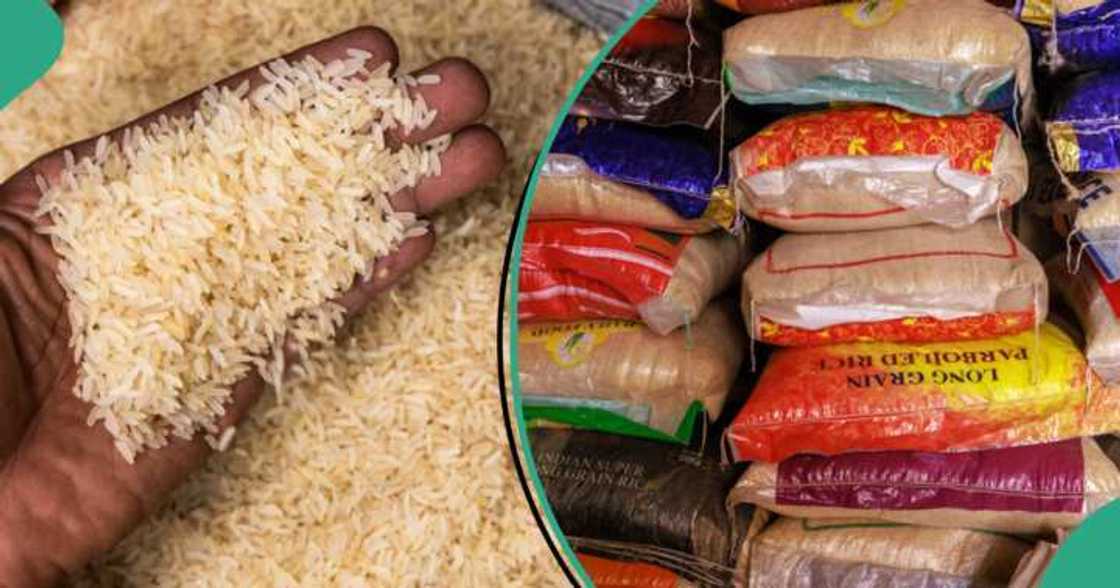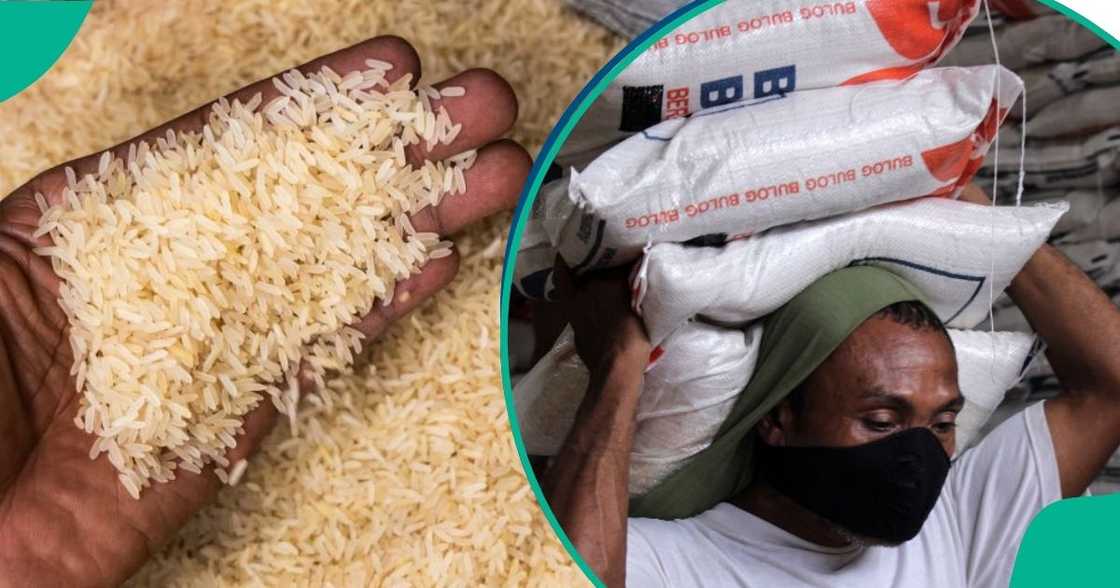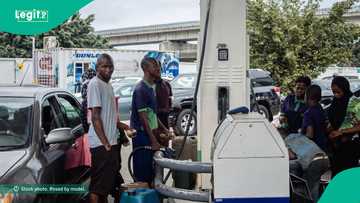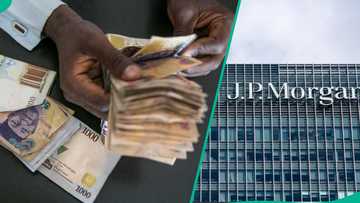Dealers Crash Price of Rice by N20,000 Per 50kg Bag as Food Costs Reduce Nationwide
- The price of rice has crashed again to N65,000 per 50kg bag from N85,000, Legit.ng can authoritatively report
- Dealers disclosed that a consignment of the commodity berthed at Nigeria’s ports recently, leading to the crash
- The first time rice sold around that range was in February this year, when it was below N70,000 per 50kg bag
Legit.ng’s Pascal Oparada has reported on tech, energy, stocks, investment and the economy for over a decade.
The price of rice, a staple food, has crashed again after rising in March to over N80,000 per 50kg bag.
Findings by Legit.ng showed that sellers reduced the commodity price from N85,000 per 50kg bag to N65,000 as of Sunday, April 13, 2025.

Source: Getty Images
Dealers report a crash in rice price
Dealers who spoke exclusively with Legit.ng stated that the crash followed the general crash in cereal prices and other food items.
They disclosed that another consignment of foreign rice berthed at Nigeria’s ports in early April, which accounted for the crash in price.
The first time the commodity sold below N70,000 per 50kg bag was in February this year when the dealers had reported another influx.
Dealers report massive imports of rice
According to them, the 150-day import duty-free window for essential food items contributed to the crash in the staple’s price.
“We’ve noticed that importers are bringing in the consignments in large quantities," said Chinedu Eze, a foodstuff dealer.
According to him, dealers have stockpiled rice because the price is still volatile and could rise shortly.
Stakeholders blame FG’s food import duty
Legit.ng earlier reported that agriculture stakeholders forecast an increase in food cycle prices by the middle of the year, due to a surge in food imports last year.
According to Foreign Trade in Goods data by the National Bureau of Statistics, the value of food imported in 2024 rose by 51.06% to N3.78 trillion.
Stakeholders connected the spike to the increase in food import value to the Nigerian government’s 150-day duty-free import window on selected food items announced in July 2024 to reduce high prices.
Farmers and some members of the private sector opposed the import waiver window, which recorded a consignment of 32,000 tonnes of rice from Thailand.
Before President Bola Tinubu’s import waiver, government policies restricted food imports, the stakeholders said.
How rice became almost unaffordable to Nigerians
The price of rice in Nigeria started increasing sharply in 2016 after President Muhammadu Buhari banned the importation of rice through land borders.
This policy was meant to encourage local rice production but led to a shortage in supply, which caused prices to rise. By 2017, a 50kg bag of rice was costing around N18,000 to N20,000.
In 2020, the COVID-19 pandemic worsened the situation. Movement restrictions and closed borders made it difficult to import essential goods like rice. By the end of that year, the price of rice had increased to N30,000 per bag.
The problem grew even worse in 2021 due to insecurity in rice-producing areas, floods, and the ongoing fall of the naira. These challenges pushed the price of a 50kg bag of rice to N50,000 by 2022.
In 2023 and 2024, rising inflation and the removal of fuel subsidy added to the burden. With higher fuel costs, transportation became more expensive, leading to even higher food prices.
By Christmas 2023, rice prices had hit N80,000 per bag. And by December 2024, the price of a 50kg bag of rice reached an all-time high of N100,000.
Food imports have reduced in Nigeria
Investigations showed that the value of food imports had reduced by 0.54% to N1.85 trillion in 2023 from N1.86 trillion in 2022.
The price of food increased 37.65% last year, as market surveys reported that food prices were crashing in Kano’s Singer Market.
In March 2025, the Nigerian government praised the reported crash in food prices as a fulfilment of its promise to reduce food inflation.
However, stakeholders have warned that the prices of essential commodities will rise by midyear 2025.
Punch reported that Kabir Ibrahim, the President of the All Farmers Association of Nigeria (AFAN), said that despite the import duty waiver achieving its purpose, continuing imports to meet the country’s food needs is not sustainable.
He warned that Nigeria could not afford to import to achieve food security or availability.

Source: Getty Images
He asked the country to work within itself to produce sufficient food to achieve food security.
Rice prices: Nigeria faces N1.43trn shortage
Legit.ng earlier reported that there is fear that Nigeria may experience a rice shortage valued at N1.43 trillion due to low production.
As of February 20, 2025, parboiled rice products sold for N679.500 per tonne in Thailand, equating to around N33,000 per 50kg.

Read also
MRS, Ardova, Hyden filling stations sell at cheaper rates than NNPC as new fuel price emerges
Milled rice production in Nigeria was projected to drop from 5.60 million and paddy rice was expected to decline to 8.30 million tonnes.
This article has been updated by head of business desk, Victor Enengedi, with additional information.
PAY ATTENTION: Сheck out news that is picked exactly for YOU ➡️ find the “Recommended for you” block on the home page and enjoy!
Proofreading by Bruce Douglas, copy editor at Legit.ng.
Source: Legit.ng

Pascal Oparada (Business editor) For over a decade, Pascal Oparada has reported on tech, energy, stocks, investment, and the economy. He has worked in many media organizations such as Daily Independent, TheNiche newspaper, and the Nigerian Xpress. He is a 2018 PwC Media Excellence Award winner. Email:pascal.oparada@corp.legit.ng

Bruce Douglas (Head of Copyeditors) Bruce Douglas has 13 years of experience in community media, including coverage of sports, human interest, crime and politics.





